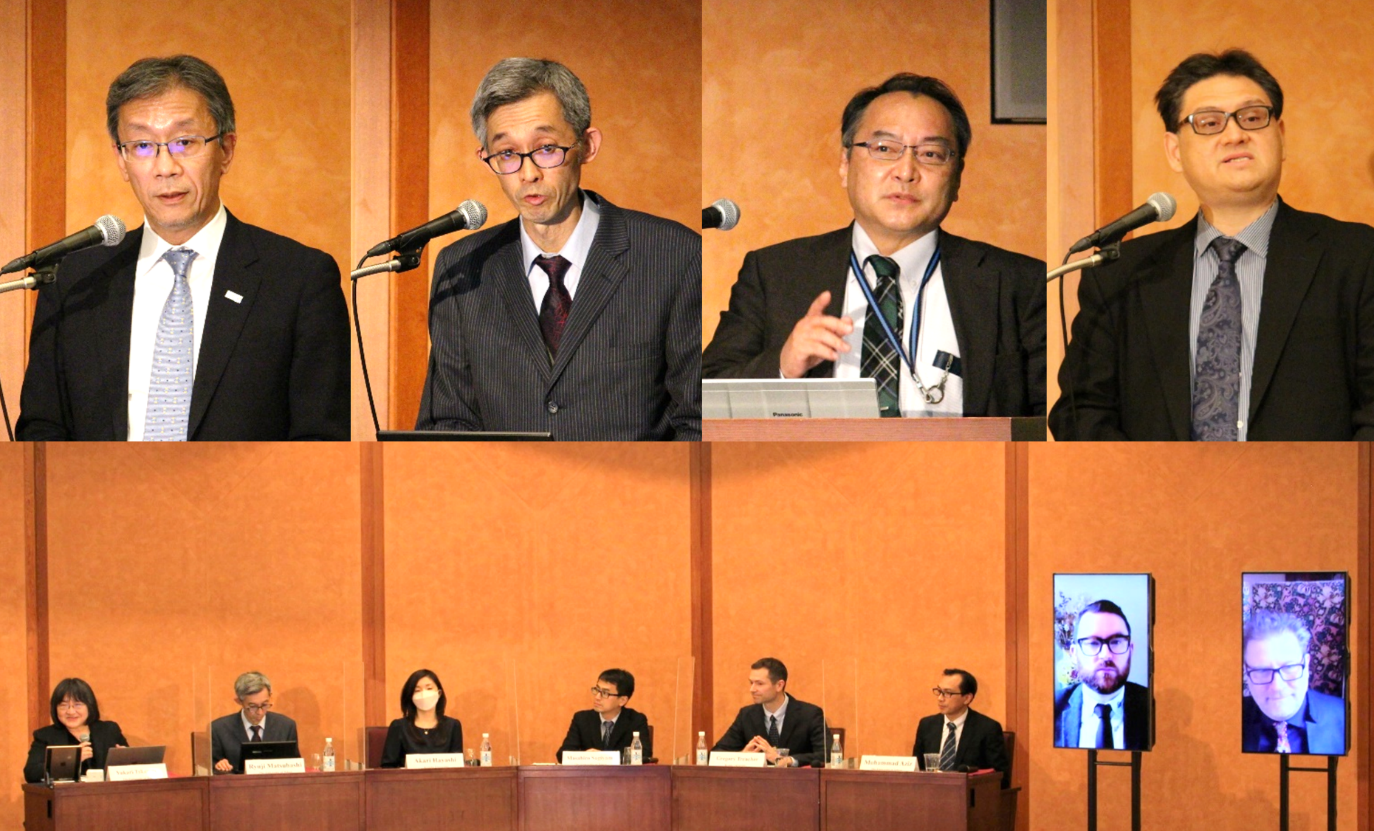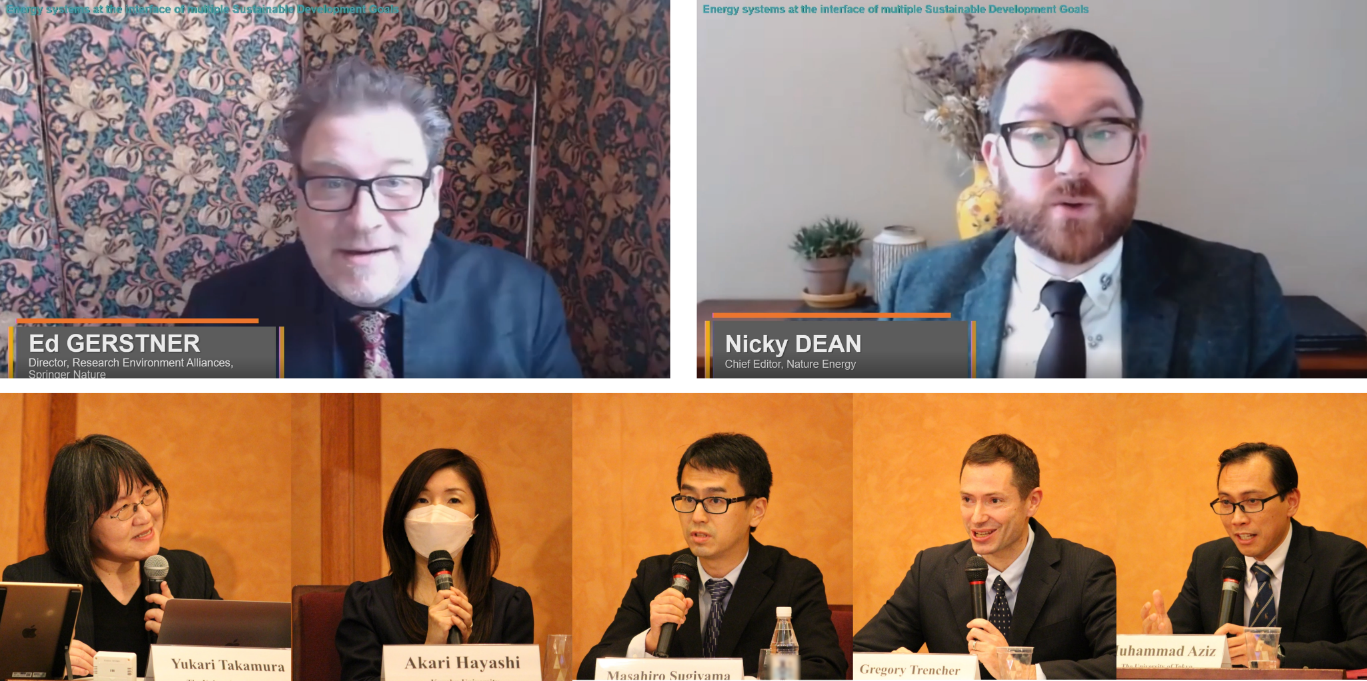Event report on the SDGs Symposium 2022 Energy systems at the interface of multiple Sustainable Development Goals

The University of Tokyo held jointly with Springer Nature a symposium on the interface of energy systems and the Sustainable Development Goals (SDGs) on 29 March 2022. This was the third SDG Symposium between the University of Tokyo and Springer Nature, following two symposia in 2019 and 2021.
The 2022 symposium focused on SDG7, “Affordable and Clean Energy,” as well as its intersections with other SDGs. This reflected the consensus that although secure and reliable access to cheap energy is a major policy priority in almost every country globally, energy systems can have multiple direct and indirect sustainability impacts. These can range from contribution to anthropogenic climate change and ecosystem degradation, to impacts on human health and wellbeing. This also reflects the prevailing perception among many scholars, policy-makers and practitioners that the transition to clean and affordable energy systems is a priority area for achieving global sustainability. To reflect upon these perceptions, the 2022 SDG Symposium brought together experts to discuss different aspects of the interface between energy systems and sustainability.
More than 400 participants from around the world attended the 2022 SDG Symposium. A basic breakdown of the participants suggests that 85% joined from Japan and 15% from other countries. Beyond academic and research institutions, several of the participants were affiliated with government agencies, private sector companies, and civil society, suggesting the transdisciplinary appeal of the event. A large number of registrants were students and early career researchers.

The Opening Remarks by President Teruo Fujii and Prof. Ryuji Matsuhashi from the University of Tokyo set the tone of the 2022 SDG Symposium. President Fujii’s remarks focused on the centrality of energy system transformation for achieving sustainability, and reflecting the UTokyo Compass and other university initiatives, pointed that in addition to basic research and education, universities should co-design solutions in close collaboration with diverse stakeholders and draw out the creative potential of young researchers to develop technological, social, and cultural innovations. Prof. Matsuhashi further outlined some of the coordinated energy research efforts undertaken within the University of Tokyo, and outlined some of the key trade-offs for achieving a sustainable energy supply.
In the first Keynote Presentation, Prof. Hiroshi Segawa from the University of Tokyo, provided insights about the current advances on next generation photovoltaics, and how they can contribute towards achieving a low carbon society. Beyond focusing on the engineering and technological aspects of these innovations, Prof. Segawa touched on the importance of collaborating with the private sector to achieve both the design and development of these energy innovations, but also to facilitate their uptake. Subsequently, Dr. Ed Gerster from Springer Nature outlined the real need for coordinated action between researchers, universities and publishers to create impactful studies and well-informed solutions to meet the SDGs, with a particular focus on SDG7. Some of the major points included the need to move beyond traditional impact metrics, champion non-standard research articles, and diversify the education of young researchers.
Subsequently five Panel Presenters critically outlined some of the different issues related to energy system transformation for sustainability. First, Prof. Akari Hayashi from Kyushu University, highlighted how the combination of renewable energy and hydrogen energy can help achieve SDG7. Subsequently, Dr. Masahiro Sugiyama from the University of Tokyo, commented on how energy scenarios can support the decarbonization transition. Dr. Gregory Trencher from Kyoto University critically discussed how energy-related research can be enriched from the perspectives of different stakeholders, and how social impact might emerge. Dr. Muhammad Aziz from the University of Tokyo focused on how to facilitate green and sustainable energy transformation for disruptive society development. Finally, Dr. Nicky Dean from Nature Energy, commented on how to support high impact research at the interface of energy and SDGs, pointing to the approach followed by many of the high impact journals of the Nature family of publications.
Given the very broad nature of SDG7, the thematic focus of each Keynote and Panel Presentation was geared towards a different aspect of this interface between energy systems and sustainability, and used different disciplinary lenses. This created a good overview of the major research challenges and key research priorities at the interface of energy systems and sustainability. However, beyond their distinct thematic focus, each presentation touched on how to enhance the societal impact of research seeking to boost the sustainability of energy systems, as well as inspire and facilitate the engagement of students and early career researchers to this type of research and related global discourses.

Finally, Prof. Yukari Takamura from the University of Tokyo coordinated a panel discussion consisting of several participants. This discussion provided further insights based on the panelists’ experience of the different aspects of the interface between energy systems and the SDGs. The main topics that were discussed during the Panel included (a) how to enhance the societal impact of research at the interface of energy and sustainability; (b) how to include the voices of marginalized stakeholders and enhance the capacity for high-impact research in the global South, and (c) how to facilitate the engagement of students and early career researchers on high-impact energy research with societal relevance. This was followed by the Closing Remarks of Dr. Antoine Bocquet from Springer Nature that summarized the main themes of the symposium.
Some of the more tangible advice to students and early career researchers during the event included suggestions on how to (1) identify the most promising areas for research at the interface of energy systems and sustainability through humble dialogues with experts from diverse fields, (2) engage in research that they are passionate about in the long-term, rather than research that is fashionable in the short-term, (3) balance mono-disciplinary versus multi-disciplinary research, (4) think long-term and engage strategically in collaborations with leading researchers, (5) be pragmatic about their abilities and capacity to conduct specific types of research, (6) use mixed methods and anchor research to the actual questions rather than ephemeral research trends, and (7) create a clear research identity. Furthermore, there were collective suggestions between speakers for the need for funding mechanisms that can facilitate the engagement of early career researchers on high-impact energy research, and efforts to promote the multi-disciplinary outlook of education curricula and graduate research to enable their critical engagement with challenging sustainability questions.
Finally, before the event President Fujii and Dr. Gerstner had a research dialogue that reflected the main dimensions of the 2022 SDG Symposium, particularly in relation to creating societal impact and facilitating the engagement of students and early career researchers. In this dialogue, President Fujii explained the UTokyo Compass strategy and talked about his own research project, namely large-scale ocean observations. The article also pointed that among Japanese institutions the University of Tokyo published in 2021 the highest number of papers, according to Dimensions, an academic literature database developed by Springer Nature. The English version of the dialogue was published in the Source, and the Japanese version in Nature Digest.
The 2022 symposium focused on SDG7, “Affordable and Clean Energy,” as well as its intersections with other SDGs. This reflected the consensus that although secure and reliable access to cheap energy is a major policy priority in almost every country globally, energy systems can have multiple direct and indirect sustainability impacts. These can range from contribution to anthropogenic climate change and ecosystem degradation, to impacts on human health and wellbeing. This also reflects the prevailing perception among many scholars, policy-makers and practitioners that the transition to clean and affordable energy systems is a priority area for achieving global sustainability. To reflect upon these perceptions, the 2022 SDG Symposium brought together experts to discuss different aspects of the interface between energy systems and sustainability.
More than 400 participants from around the world attended the 2022 SDG Symposium. A basic breakdown of the participants suggests that 85% joined from Japan and 15% from other countries. Beyond academic and research institutions, several of the participants were affiliated with government agencies, private sector companies, and civil society, suggesting the transdisciplinary appeal of the event. A large number of registrants were students and early career researchers.

The Opening Remarks by President Teruo Fujii and Prof. Ryuji Matsuhashi from the University of Tokyo set the tone of the 2022 SDG Symposium. President Fujii’s remarks focused on the centrality of energy system transformation for achieving sustainability, and reflecting the UTokyo Compass and other university initiatives, pointed that in addition to basic research and education, universities should co-design solutions in close collaboration with diverse stakeholders and draw out the creative potential of young researchers to develop technological, social, and cultural innovations. Prof. Matsuhashi further outlined some of the coordinated energy research efforts undertaken within the University of Tokyo, and outlined some of the key trade-offs for achieving a sustainable energy supply.
In the first Keynote Presentation, Prof. Hiroshi Segawa from the University of Tokyo, provided insights about the current advances on next generation photovoltaics, and how they can contribute towards achieving a low carbon society. Beyond focusing on the engineering and technological aspects of these innovations, Prof. Segawa touched on the importance of collaborating with the private sector to achieve both the design and development of these energy innovations, but also to facilitate their uptake. Subsequently, Dr. Ed Gerster from Springer Nature outlined the real need for coordinated action between researchers, universities and publishers to create impactful studies and well-informed solutions to meet the SDGs, with a particular focus on SDG7. Some of the major points included the need to move beyond traditional impact metrics, champion non-standard research articles, and diversify the education of young researchers.
Subsequently five Panel Presenters critically outlined some of the different issues related to energy system transformation for sustainability. First, Prof. Akari Hayashi from Kyushu University, highlighted how the combination of renewable energy and hydrogen energy can help achieve SDG7. Subsequently, Dr. Masahiro Sugiyama from the University of Tokyo, commented on how energy scenarios can support the decarbonization transition. Dr. Gregory Trencher from Kyoto University critically discussed how energy-related research can be enriched from the perspectives of different stakeholders, and how social impact might emerge. Dr. Muhammad Aziz from the University of Tokyo focused on how to facilitate green and sustainable energy transformation for disruptive society development. Finally, Dr. Nicky Dean from Nature Energy, commented on how to support high impact research at the interface of energy and SDGs, pointing to the approach followed by many of the high impact journals of the Nature family of publications.
Given the very broad nature of SDG7, the thematic focus of each Keynote and Panel Presentation was geared towards a different aspect of this interface between energy systems and sustainability, and used different disciplinary lenses. This created a good overview of the major research challenges and key research priorities at the interface of energy systems and sustainability. However, beyond their distinct thematic focus, each presentation touched on how to enhance the societal impact of research seeking to boost the sustainability of energy systems, as well as inspire and facilitate the engagement of students and early career researchers to this type of research and related global discourses.

Finally, Prof. Yukari Takamura from the University of Tokyo coordinated a panel discussion consisting of several participants. This discussion provided further insights based on the panelists’ experience of the different aspects of the interface between energy systems and the SDGs. The main topics that were discussed during the Panel included (a) how to enhance the societal impact of research at the interface of energy and sustainability; (b) how to include the voices of marginalized stakeholders and enhance the capacity for high-impact research in the global South, and (c) how to facilitate the engagement of students and early career researchers on high-impact energy research with societal relevance. This was followed by the Closing Remarks of Dr. Antoine Bocquet from Springer Nature that summarized the main themes of the symposium.
Some of the more tangible advice to students and early career researchers during the event included suggestions on how to (1) identify the most promising areas for research at the interface of energy systems and sustainability through humble dialogues with experts from diverse fields, (2) engage in research that they are passionate about in the long-term, rather than research that is fashionable in the short-term, (3) balance mono-disciplinary versus multi-disciplinary research, (4) think long-term and engage strategically in collaborations with leading researchers, (5) be pragmatic about their abilities and capacity to conduct specific types of research, (6) use mixed methods and anchor research to the actual questions rather than ephemeral research trends, and (7) create a clear research identity. Furthermore, there were collective suggestions between speakers for the need for funding mechanisms that can facilitate the engagement of early career researchers on high-impact energy research, and efforts to promote the multi-disciplinary outlook of education curricula and graduate research to enable their critical engagement with challenging sustainability questions.
Finally, before the event President Fujii and Dr. Gerstner had a research dialogue that reflected the main dimensions of the 2022 SDG Symposium, particularly in relation to creating societal impact and facilitating the engagement of students and early career researchers. In this dialogue, President Fujii explained the UTokyo Compass strategy and talked about his own research project, namely large-scale ocean observations. The article also pointed that among Japanese institutions the University of Tokyo published in 2021 the highest number of papers, according to Dimensions, an academic literature database developed by Springer Nature. The English version of the dialogue was published in the Source, and the Japanese version in Nature Digest.






